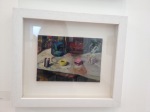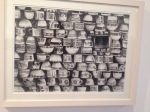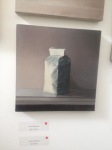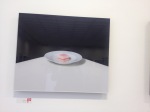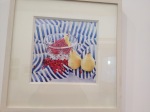
Tag Archives: Ireland
Face it: the fucking Moon is on Uranus
Some weeks you just have to face that there are interplanetary forces beyond your control at play. You have no choice but to accept that the fucking Moon is on Uranus and move on or, more likely, move sideways, like a hobbling crab on a rocky beach looking for shelter in a crevice.
This last week has been one of those weeks for me: I am liberally using the term week to cover the last ten days and counting. The shit fest may last a fortnight or longer, who knows.
There have been shootings indirectly, but worryingly and freakishly, connected to my future, I kid you not. There have been misunderstandings; acute pains; a sense of foreboding and dread; darkness.
On a political level, the UK chose to leave Europe for the stinkiest reasons possible, unleashing a tide of ill feeling and queasy regret that is wafting across the Irish Sea; making these last few days as depressing and unpredictable as the I-am-taking-a-dump-on-your-head-Seven-Plagues-of-Egypt weather that has put the kibosh on the brief summer spell we had at the end of May.
To top it all up, I went to bed last night having learnt that Partido Popular (a de facto criminal organisation mired in corruption and malfeasance) has won the election in Spain, getting more seats in Parliament in this second round than they did at the end of December. Their “ideology”, and I am using the term very loosely, revolving around the worst tenets of greedy free market policy and intrusive narrow-minded social conservatism, has garnered around eight million votes. I realise once more that Franco’s ghost is still haunting Spain: a mediocre, vindictive, choke-the-air-out-of-the-country spectre that will not be rid off until we perform the collective exorcism that we are too pusillanimous to face.
There just aren’t words to describe the ill feeling that has taken over me. Well, there are, in English they mostly start with “f”; in Spanish they include some highly scatological takes on the holy host. I will spare you the details.
I tend to make minor corrections to these rotten spells through food and drink but fate has not finished slapping me around just yet. This afternoon I stood at the cash register of my local supermarket with a bottle of bubbly and some coffee cake, amongst other treats, hoping they would provide an antidote to the poison of the week. As I am about to pay, the cashier informs me that they are not taking Bank of Ireland cards as the servers are down. I have no cash. I leave everything behind and I go home with my tail between my legs.
There is some cheddar cheese and the dregs of some take away salad in the fridge.
Face it: the fucking Moon is on Uranus.

Brexit at Tiffany’s? No. We are a tabloid.
The hungry tree
Child, mark my words, do not sit on that bench…

What do you do when your bread goes stale?
- Grandmother
“Bread is bread,” my grandmother would have said. Stale or fresh: bread is bread. Our Father, give us our daily bread. Let’s break bread. It is their bread and butter. She thinks she is the best thing since bread. He knows which side his bread is buttered on.
This young woman, exhausted and broken at only thirty years of age in her minute unfurnished kitchen never throws bread out. It is a sin. Bread goes fast from under the fingers of hungry children in post war Spain. Two little girls, my mother and one of her sisters, fight over a piece of bread. Tooth and nail.
The fight was so fierce their oldest sister remembers it to this day. “Who won?” I ask. “I cannot remember.” She replies. All she can remember is that they went at it like cats. Four years of age. Five years of age.
Bread could hardly go stale in a house full of fiery hungry girls. If it falls on the floor you pick it up. Bless it. Lightly kiss it. Put it back on the plate. Hastily eat it before it is claimed by anyone else.
Bread going stale is like seeing the tail end of a rainbow after heavy rain. Bread going stale means a piece of lard or a slice of ham; turnips on the roast; a fistful of chestnuts. Bread going stale signals a temporary windfall, a pair of brackets on the long text of hunger. How can bread go stale when there is nothing else to eat but runny lentils or the claw of a chicken thrown into a clear broth of onion and tears?
- Mother
I am six, seven, eight years of age and every day my mother sends me to buy a stick of bread after school. It costs twenty-five pesetas; she carefully slides every coin onto the palm of my hand and makes me close it into a fist before I take off. On my way back I eat the top crust skipping over the cracks on the pavement. When I reach my tower block I burrow my fingers in the hole and pull out its fluffy white dough to stuff it in my mouth as the lift goes up to our flat. The fresh smell of bread and the stale smell of bleach mix up as I am taken up to the fourth floor. I push the bread into the cloth bag before giving it to my mother, maimed.
Fresh bread every day and plenty more: jars of Nutella; Marietta biscuits; apples and oranges; soupy rice; boiled ham and cured ham; slices of chorizo; crunchy carrots; Manchego cheese; a glass of flavoured milk; popcorn; chicken wings crisply fried you think nothing of; a fried egg; green beans with boiled potatoes; crisps; a pomegranate deseeded into a bowl.
Yet every morning, my mother brings me a bowl of yesterday’s bread broken into a bowl of warm milk with a sprinkle of sugar. She lets me sit on the edge of her bed in my nightgown and side-by-side, in silence, we eat our bowl of stale bread in warm milk and we listen to her favourite serial on the radio.
- Daughter
I am sitting across from a close friend in a fashionable restaurant in Dublin city. We scan the menu before we make our selection. We have commented on the décor being to our taste: just-so hints of modernism in the carefully contrived veneer of its sparseness. The turquoise blue of the velvet banquettes, we sigh. The leather tan on the chairs, say no more. The aluminium industrial frame of the legs of the tables shining over the parquet, she nods. I admire the deep blue tint on the wall before a tall glass partition. She peers beyond the glass to our right, trying to see beyond the railings of a balcony that hovers over the inner courtyard downstairs. I’d like to have an elderflower martini later, I say. Fat chance with all the revellers downstairs crowding the cocktail bar.
The waiter comes to take our order. I hesitate between having the asparagus and prosciutto salad or the Tuscan Panzanella salad for starters, not knowing what the ingredients are in the latter. The waiter tells me that the main ingredient is bread soaked in a tomato sauce and I nod. I will have that.
When the salad arrives we realise that the bread is a version of our “migas”; our “picatostes”: stale bread given a second wind in a marinade of vinegar and tomato. It is the first of three courses for me. I have my elderflower martini at the table at the close of the meal.

Was it for this that all that blood was shed…?
Ah, well. Happy Paddy’s Day everyone!
Essentials
- A packet of toothpicks.
- A drum of olives.
- A leg of ham.
- A whole watermelon.
- An oil canister with filter.
- A crate with six cartons of milk.
- A bunch of grapes wrapped in light cardboard.
- Two different bottles of wine, half empty and corked.
- An octopus.
- A kilo of prawns with their heads, tails, and shells on.
Ten items you may find in a Spanish kitchen that you are unlikely to find in an Irish one.
Flavour on canvas 2015
A visit to the RHA Annual Exhibition in Dublin puts your eyes on the tip of your tongue. Click on each photo to enlarge.
Hell, yeah!
The person who eats with you most evenings. The person that pushes your trolley at the supermarket. The person who can pick food from your plate without asking for permission. The person whose food you can take without embarrassment. The person who helps you clean your fridge. The person who peeled the spuds for dinner. The person who grates cheese because you hate doing it. The person who takes the heavy shopping bags out of the car. The person who ate the roast you cooked even though it was dry and a bit burnt. The person who made a complicated family recipe just for you. The person who stacks the plates wrong in the dishwasher. The person who knows how you like your coffee. The person who never cooks with an ingredient you cannot stomach even though they love it. The person who peers over the Sunday supplement as you have your breakfast, smiles, nods, and says nothing. The person who will go out to get you a proper sandwich because the ones in the machine in the waiting area at the hospital are manky. The person who will hold your chin and open your mouth and feed you when you are old and weak and almost broken. The person who nourishes you.
Your friend. Your lover. Your girlfriend. Your boyfriend. Your husband. Your wife. Your future wife. Your future husband. Your family. Whoever you are, whomever you love.
Yes to marriage equality in Ireland.
Tea break
“I think it is ‘ne-pawl’, yeah. I think that is the correct pronunciation.” The man in the grey fleece puts the newspaper down, looking up, a benign but quizzical smile spreading across his jowly face peppered with a five o’clock shadow. He is waiting for the final nod that will seal the debate.
“But I think you can also pronounce it ‘ne-pahl’. I think that is also right. That’s the way they say it on RTE. I think both are correct. Wouldn’t you say?” The older man’s questions are always rhetorical, although most ignore this feature of his speech just as they have grown accustomed to his crystal clear pronunciation and perfectly parsed sentences.
“Ah well. RTE. What do you expect? It’s because “a” in Irish is “ah”. That’s why they say it that way. It has always been ‘ne-pawl’. You cannot trust the RTE pronunciation to be correct.” The man from the North in the blue shirt with the firmly fastened top button and matching indigo tie smiles wryly, letting his sarcasm bounce off the polished surface of the older man’s manners.
“I´d say both are correct.” The older man iterates, and then glances at the picture on the front of The Irish Times once more and, deftly deflecting the trajectory of the last volley he was served adds, “The clothes she is wearing are so colourful. You would not think of anything tragic looking at those vibrant colours. The colours you see in Asia…“ And for a moment his sentence trails off, uncharacteristically bereft of his usual fluency as he takes a sip of his tea, “…it’s a whole different culture.”
“That it is.” Says the man in the grey fleece and he pushes the plate of shortbread biscuits towards the older man, who is trying to reach them across the veneered oak table.




